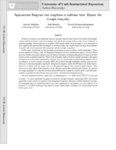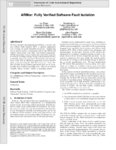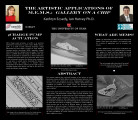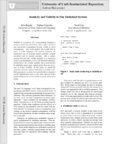Filters: Format: "application/pdf" School Or College: "College of Engineering" Collection: "ir_uspace"
| Creator | Title | Description | Subject | Date | ||
|---|---|---|---|---|---|---|
| 251 |
 |
Pulsipher, Dennis Carl | Application of adaptive noise cancellation to noise reduction in audio signals | The LMS adaptive noise cancellation algorithm has been applied to the removal of high-level white noise from audio signals. Simulations and actual acoustically recorded signals have been processed successfully, with excellent agreement between the results obtained from simulations and the results ob... | Noise cancellation; Noise reduction; White noise; LMS algorithm | 1979 |
| 252 |
 |
Furse, Cynthia M. | Application of phase detection frequency domain reflectometry for locating faults in an F-18 flight control harness | The performance of a phase-detection frequency-domain reflectometer (PD-FDR) for locating open and short circuits (hard faults) in a Navy F-18 flight control harness has been tested, and the analytical expressions for accuracy verified. Nine different types of aircraft wires appear in this harness:... | Phase detection; Frequency domain reflectometry; PD-FDR; Wire fault location; Aging wire; Flight control harness | 2005-05 |
| 253 |
 |
Boll, Steven F. | Application of the saber method for improved spectral analysis of noisy speech | A stand alone noise suppression algorithm is described for reducing the spectral effects of acoustically added noise in speech. A fundamental result is developed which shows that the spectral magnitude of speech plus noise can be effectively approximated as the sum of magnitudes of speech and noise.... | Noise suppression algorithm; SABER method | 1977 |
| 254 |
 |
Riesenfeld, Richard F. | The application of total positivity to computer aided curve and surface design | Of particular importance in an interactive curve and surface design system is the interface to the user. The mathematical model employed in the system must be sufficiently flexible for interaction between designer and machine to converge to a satisfactory result. The mathematical theory of Total Pos... | interactive curves; total positivity | 1979 |
| 255 |
 |
Jacobson, Hans; Gopalakrishnan, Ganesh | Application specific asynchronous microengines for efficient high-level control | Despite the growing interest in asynchronous circuits programmable asynchronous controllers based on the idea of microprogramming have not been actively pursued Since programmable control is widely used in many commercial ASICs to allow late correction of design errors to easily upgrade product f... | Asynchronous microengines | 1997 |
| 256 |
 |
Jacobson, Hans | Application specific asynchronous microgengines for efficient high-level control | Despite the growing interest in asynchronous circuits, programmable asynchronous controllers based on the idea of microprogramming have not been actively pursued. Since programmable control is widely used in many commercial ASICs to allow late correction of design errors, to easily upgrade product ... | Asynchronous microgengines; Programmable asynchronous controllers | 1997 |
| 257 |
 |
Jayamohan, Harikrishnan | Applications of microfluidics for molecular diagnostics | Diagnostic assays implemented in microfluidic devices have developed rapidly over the past decade and are expected to become commonplace in the next few years. Hundreds of microfluidics-based approaches towards clinical diagnostics and pathogen detection have been reported with a general theme of ra... | Microfluidics; Micro-total-analysis-systems; Lab-on-a-chip; Point-of-care devices; Sample preparation; MEMS; Rapid prototyping; Biomarker detection; Personalized medicine; Global health care | 2012-11-04 |
| 258 |
 |
Venkatasubramanian, Suresh | Approximate Bregman near neighbors in sublinear time: beyond the triangle inequality | Bregman divergences are important distance measures that are used extensively in data-driven applications such as computer vision, text mining, and speech processing, and are a key focus of interest in machine learning. Answering nearest neighbor (NN) queries under these measures is very important i... | 2012-01-01 | |
| 259 |
 |
Henderson, Thomas C. | Arc and path consistency revisited | Mackworth and Freuder have analyzed the time complexity of several constraint satisfaction algorithms [4]. We present here new algorithms for arc and path consistency and show that the arc consistency algorithm is optimal in time complexity and of the same order space complexity as the earlier algor... | Arc consistency; Path consistency; Constraint satisfaction algorithms | 1985 |
| 260 |
 |
Wehrli, Robert | ARCAID: The ARChitects computer graphics AID | ARCAID?The ARChitect's Computer Graphics AID?is one part of a two-part research program at the University of Utah under the direction of David C. Evans. ARCAID is a specification for the organization of computer processes including data and procedures for the use of architects, engineers, and other... | ARCAID | 1970 |
| 261 |
 |
Balasubramonian, Rajeev | Architecting efficient interconnects for large caches with CACTI 6.0 | Efficiently executing multithreaded applications on future multicores will require fast intercore communication. Most of this communication happens via reads and writes to large shared caches in the memory hierarchy. Microprocessor performance and power will be strongly influenced by the long inter... | Interconnects; CACTI 6.0; Non-uniform cache architectures (NUCA) | 2008-01 |
| 262 |
 |
Myers, Chris J. | Architectural synthesis of timed asynchronous systems | This paper describes a new method for architectural synthesis of timed asynchronous systems. Due to the variable delays associated with asynchronous resources, implicit schedules are created by the addition of supplementary constraints between resources. Since the number of schedules grows exponenti... | 1999 | |
| 263 |
 |
Davis, A.L. | The architecture of DDMl: a recursively structured data driven machine | An architecture for a highly modular, recursively structured class of machines is presented. DDMl is an instance of such a machine structure, and is capable of executing machine language programs which are data driven (data flow) nets. These nets may represent arbitrary amounts of concurrency as wel... | DDMl; machine structure; machine language programs | 1977 |
| 264 |
 |
Horch, Kenneth W. | Are the extrinsic muscles better suited for signaling joint angles or finger tip location? | We used a biomechanical model of the human long finger to determine whether the extrinsic muscles are better suited for estimating the finger's joint angles or for estimating location of the finger tip. We found that two of the extrinsic muscles together could provide information sufficient to direc... | Extrinsic muscles; Metacarpophalangeal joint; Biomechanical models | 1997 |
| 265 |
 |
Regehr, John | ARMor: fully verified software fault isolation | We have designed and implemented ARMor, a system that uses software fault isolation (SFI) to sandbox application code running on small embedded processors. Sandboxing can be used to protect components such as the RTOS and critical control loops from other, less-trusted components. ARMor guarantees m... | 2011-01-01 | |
| 266 |
 |
Ecsedy, Kathryn Lyn; Harvey, Ian R. | The artistic applications of M.E.M.S.: gallery on a chip | Our research explored the crossroads between art and science to create tiny devices known as MEMS (Micro Electrical Mechanical Systems). These artistic devices are powered by micro charge-pumped actuation of electrons in a scanning electron microscope, utilizing a phenomenon once considered an irri... | Artistic applications; MEMS; Micro Electrical Mechanical Systems; Kinetic micro sculpture; Micro charge pump actuation; Trapeze Interactive Poster | 2010-03-15 |
| 267 |
 |
Gooch, Bruce; Reinhard, Erik; Moulding, Chris; Shirley, Peter S. | Artistic composition for image creation | Altering the viewing parameters of a 3D object results in computer graphics images of varying quality. One aspect of image quality is the composition of the image. While the esthetic properties of an image are subjective, some heuristics used by artists to create images can be approximated quanti... | Image creation; Image quality | 2000 |
| 268 |
 |
Shirley, Peter S.; Gooch, Bruce | Artistic vision: painterly rendering using computer vision techniques | We present a method that takes a raster image as input and produces a painting-like image composed of strokes rather than pixels. Unlike previous automatic painting methods, we attempt to keep the number of brush-stroke small. This is accomplished by first segmenting the image into features, finding... | Painting-like image; Raster image; Painterly rendering | 2000 |
| 269 |
 |
Carter, John B. | AS-COMA: An adaptive hybrid shared memory Architecture | Scalable shared memory multiprocessors traditionally use either a cache coherent nonuniform memory access (CC-NUMA) or simple cache-only memory architecture (S-COMA) memory architecture. Recently, hybrid architectures that combine aspects of both CC-NUMA and S-COMA have emerged. In this paper, we pr... | AS-COMA; Hybrid shared memory | 1998 |
| 270 |
 |
Carter, Tony M. | ASSASSIN : a CAD system for self-timed control-unit design | Many software systems exist for automatically implementing synchronous state machines . Presented is this paper is a software system -- ASSASSIN -- for the design and automatic layout of self-timed (or speed- independent) control units as integrated circuit modules. | ASSASSIN; Self-timed control units | 1982 |
| 271 |
 |
Sikorski, Kris | Asymptotic near optimality of the bisection method | The bisection method is shown to possess the nearly best rate of convergence for infinitely differentiable functions having zeros of arbitrary multiplicity. If the multiplicity of zeros is bounded, methods are known which have asymptotically at least quadratic rate of convergence. | Bisection method | 1988 |
| 272 |
 |
Gopalakrishnan, Ganesh | Asynchronous circuit verification using trace theory and CCS | We investigate asynchronous circuit verification using Dill's trace theory as well as Milner's CCS (as mechanized by the Concurrency Workbench). Trace theory is a formalism specifically designed for asynchronous circuit specification and verification. CCS is a general purpose calculus of communicat... | Trace theory; Verification; CCS | 1992 |
| 273 |
 |
Stringfellow, Gerald B. | Atomic force microscopy study of ordered GaInP | Examines the nature of the steps on the surface of gallium indium phosphide lattice layers matched to gallium arsenide substrates using atomic force microscopy. Temperatures of organometallic vapor phase epitaxy used; Relation of height of steps with misorientation angle; Link of supersteps with the... | Surface chemistry; Lattice theory | 1995 |
| 274 |
 |
Stringfellow, Gerald B.; Williams, Clayton C. | Atomic ordering of GaInP studied by Kelvin probe force microscopy | The atomic ordering of GaInP has been established and studied by a variety of methods, including transmission electron microscopy, cathodoluminescence, and photoluminescence. In this work, a Kelvin probe force microscope _x0002_KPFM_x0003_ has been employed to image several GaInP samples previous... | Cathodoluminescence; Photoluminescence; Surface morphology | 1995 |
| 275 |
 |
Regehr, John | Atomicity and visibility in tiny embedded systems | Visibility is a property of a programming language's memory model that determines when values stored by one concurrent computation become visible to other computations. Our work exploits the insight that in nesC, a C-like language with explicit atomicity, the traditional way of ensuring timely visib... | 2006-01-01 |
